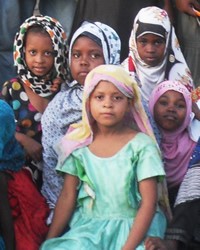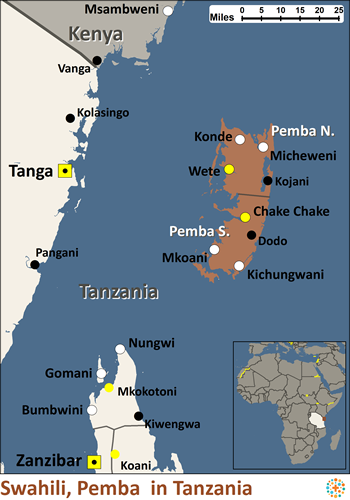The name Swahili literally means "coast," and is the name given to several people groups that share a common culture (Uswahili), language (Kiswahili), and religion (Islam). Thousands of years ago, hunters inhabited the East African coast and intermarried with the shepherds there. By the second century, people from northern Congo came to the area and intermarried with them. Subsequent groups of people migrating from other areas such as the Persian Gulf also joined these coastal people, adopting parts of their culture and language. Later, Indonesian, Hindi, and Portuguese traders settled on the coast. Soon, they too began adopting Swahili traits and became a part of the larger group. The Swahili language has many different dialects. A number of its words were borrowed from Arabic, the second language for many Swahili. As you could imagine from the mix of people who have joined under the "Swahili" umbrella, this language is very complicated. Though they are called "Swahili" by others, they prefer to be named according to their local settlements. Since that time, groups of Swahili have migrated to different parts of the coast, forming their own dialects and cultural variations. Pemba, for example, refers to an island off the coast of Tanzania. It is also one of the Swahili groups. They are most likely to be living up and down the East African coast, and their highest populations are in Somalia and Tanzania, the latter where it is used in schools along with English as a trade language.
For about 2,000 years, the backbone of the Swahili economy has been commerce no matter what part of Africa they live in. They worked as cross-national merchants trading spices, slaves, ivory, gold, and grain. Today, international commerce is still important to the Swahili but to a lesser degree. Many of the upper-class Swahili now manage small businesses, do clerical work, and teach school. Those living in cities sometimes own plantations that provide both their income and their food supply. Most lower-class Pemba Swahili are farmers. Their principal crops include rice, sorghum, millet, and maize. Since the Swahili in Tanzania are predominantly Muslim, Islamic practices play a large role in their daily activities. Dietary laws, rules of dress, social etiquette, marriage ceremonies, laws concerning divorce, and rituals at birth and death are all governed by Islamic tradition. Parents strive to have well-mannered, respectful children, since this is highly valued among Muslims. Boys go to Islamic schools where they study the Koran. The central building in each town is the mosque. The male population prays there five times a day and at special prayer meetings on Fridays.
The Swahili in Tanzania have recently demonstrated an interest in Western culture. For example, in addition to attending Islamic schools, most children also attend non-religious schools to acquire a Western-style education. Also, traditional Swahili folk medicines are no longer the only means of treating those with illnesses. In some areas there are modern medical clinics. Many of the Swahili people who live in large cities now own televisions through which they are constantly being exposed to Western ideas. Swahili women are more independent today than in times past and are becoming more involved in the economic and social realms of society.
Swahili culture has not only been influenced by the Islamic religion and Western ideas but also by the Northeast Bantu (from Sub-Saharan Africa) and Arab cultures, as well as Asian, Persian and Indian cultures. This has made their culture quite unique, and they can easily be distinguished from their neighbors. Their art has been affected by far-away cultures.
The Pemba Swahili people are Sunni Muslims who believe that the supreme God, Allah, spoke through his prophet, Mohammed, and taught mankind how to live a righteous life through the Koran and the Hadith. To live a righteous life, you must utter the Shahada (a statement of faith), pray five times a day facing Mecca, fast from sunup to sundown during the month of Ramadan, give alms to the poor, and make a pilgrimage to Mecca if you have the means. Muslims are prohibited from drinking alcohol, eating pork, gambling, stealing, slandering, and making idols. They gather for corporate prayer on Friday afternoons at a mosque, their place of worship.
The two main holidays for Sunni Muslims are Eid al Fitr, the breaking of the monthly fast and Eid al Adha, the celebration of Abraham's willingness to sacrifice his son to Allah.
Sunni religious practices are staid and simple. They believe Allah has pre-determined our fates; they minimize free will.
In most of the Muslim world, common people depend on the spirit world for their daily needs since they regard Allah as too distant. Allah may determine their eternal salvation, but the spirits determine how well they live on a daily basis. For that reason, some Muslims appease spirits using charms and amulets to help them with spiritual forces. More orthodox Muslims consider these practices heretical and un-Islamic.
The Pemba Swahili people need to be given the chance to hear the life-changing gospel so they can enjoy life to the full.
Pray for loving gospel workers to catch a vision for reaching the Pemba Swahili people for Jesus and that in God's sovereign timing the hearts of these people would be open and ready to follow him.
Pray for Jesus movements to bless extended families so the gospel will spread rapidly.
Pray for the spiritual lives of the Pemba Swahili people to become fruitful so others will be drawn to Jesus Christ.
Scripture Prayers for the Swahili, Pemba in Tanzania.
https://en.wikipedia.org/wiki/Pemba_Island
https://www.britannica.com/topic/Swahili-language
| Profile Source: Joshua Project |

























